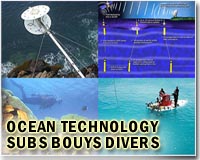| . |  |
. |
Washington (UPI) Feb 9, 2011 The National Oceanic and Atmospheric Administration has released a draft policy on aquaculture in U.S. waters, saying it balances economics and the environment. After crude oil and natural gas, seafood is the third-largest contributor to the U.S. trade deficit as the country imports about $9 billion worth each year, AAAS ScienceMag.org reported Wednesday. Hoping to foster the growth of a U.S. aquaculture industry, NOAA says it will use its $10 million research budget to do more ecological and technological analysis to improve and monitor the environmental sustainability of aquaculture operations. Although the draft policy contains a fairly detailed research agenda for the agency's scientists, it's lacking in any details of how it plans to regulate the industry -- just suggesting, for example, that it would prefer "only native or naturalized species in federal waters" unless other species are proved to be no threat to the ecosystem. George Leonard of the Ocean Conservancy in Santa Cruz, Calif., hailed the policy as a positive development, but noted in a statement that "because the policy is largely discretionary there is no guarantee that future fish farms will meet the suite of policy guidelines proposed today." NOAA says the draft police is open for public comment until April 11.
earlier related report Drilling in the Mediterranean's eastern region shared by Turkey, Israel and Egypt, "could cause irreversible damage" to its biodiversity, said Sergi Tudela, head of WWF's Mediterranean Fisheries Programme. The area hosts rare and millennia-old species such as deep-sea sponges, worms, mollusks and cold water corals, and therefore are "particularly fragile and vulnerable to external interference," he added in a statement. Once a deep-sea floor has been drilled, "it can take a millennium or more before the unique micro-ecosystem grows again, so the most fragile and valuable species and under-sea areas must be left untouched by gas development." The recently discovered Leviathan gas field, 135 kilometres off the Israeli coast, is the world's biggest deep-water gas discovery in a decade, with an estimated volume of 16 trillion cubic feet of gas. Earlier this year the West Nile Delta gas field was discovered, lying in Egyptian waters 80 kilometres off Alexandria. The green group called on a handful of Mediterranean countries and the European Union to ban industrial development and drilling in deep-sea areas where the biodiversity is rich.
Share This Article With Planet Earth
Related Links Water News - Science, Technology and Politics
 Thailand closes dive spots due to reef damage
Thailand closes dive spots due to reef damageBangkok (AFP) Jan 21, 2011 Thailand has closed a host of popular dive sites to tourists indefinitely to allow coral reefs to recover from widespread bleaching caused by warmer sea temperatures, authorities said Friday. In total 18 areas in seven marine parks are off-limits, according to an order by the Thai National Park, Wildlife and Plant Conservation Department. "Diving in all the spots is to be halted indefini ... read more |
|
| The content herein, unless otherwise known to be public domain, are Copyright 1995-2010 - SpaceDaily. AFP and UPI Wire Stories are copyright Agence France-Presse and United Press International. ESA Portal Reports are copyright European Space Agency. All NASA sourced material is public domain. Additional copyrights may apply in whole or part to other bona fide parties. Advertising does not imply endorsement,agreement or approval of any opinions, statements or information provided by SpaceDaily on any Web page published or hosted by SpaceDaily. Privacy Statement |